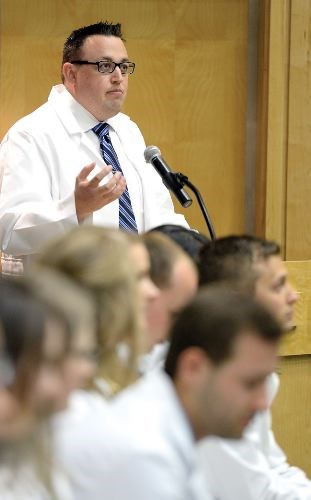For Ryan LeBlanc the journey toward medicine has been one in search of more: more understanding, more expertise, more knowledge.
By 2010, LeBlanc already had his pharmacy degree, but he soon learned that wasn't enough.
"You're definitely an expert on the drug information but I found there was a lot of things that I didn't know," LeBlanc said.
"I found I wanted to be much more involved," said the 29-year-old, one of 30 students who graduated in the Northern Medical Program's eighth class Saturday.
Medicine meant he could be involved in every aspect of patient care.
"I had a personal need that I needed to know everything," said LeBlanc, winner of the
Dr. Joe Sidorov Award of Excellence in Internal Medicine.
That personal drive is one of the reasons the Quesnel-born LeBlanc thinks rural or northern medicine is the home for him. Doctors in smaller centres need to manage more things with limited resources, he said. Specialists may not be readily available, meaning the more the doctors know, the better for the patients.
"You're much more driven to be able to practice a full scope of general internal medicine meaning you can manage every subspecialty of it because you may not have a respirologist on call to come and do a bronchoscopy for you so you need to have that knowledge."
Nine of the graduates which will be entering family practice residency programs in the north, including six in Prince George. Although LeBlanc's headed to Victoria for his residency, he hopes the three-year program includes a stint back in the city.
And LeBlanc figures he, and his northern cohort counterparts, have an advantage in the type of education they received. While the lecture material and degree is from the University of British Columbia, the clinical portion happens in Prince George.
"The clinical experiences we get for being in a smaller centre like this were unparalleled by far," he said, adding it led to more opportunities to practice.
"When you're in an area like Prince George, it's not uncommon for you to be working one-on-one with the attending physician. So your teams are smaller and you have much more responsibility as a third-year medical student. You learn much more and it prepares you much better for residency."
The program also includes a cultural competency competent, which trains students to better interact with aboriginal patients and acknowledges the complicated history between aboriginal people and the health care system.
"There is somewhat of an underlying layer of distrust that you have to work beyond so you can provide adequate care for them and build that therapeutic relationship," he said.
It comes back to knowledge - a recurring theme for LeBlanc. For example, pauses are seen among some aboriginal communities as a way to reflect on information, but in western culture it is common to feel obliged to fill that silence.
"That can actually interrupt the thought flow and actually detract from the relationships," said LeBlanc, who has Mtis heritage.
"There's small characteristics like that but things that you can do by being a little bit aware of the cultural specifics that you can provide better care for them and make them feel more comfortable."
As valedictorian of his class LeBlanc thanked friends and family ("You don't go through medical school alone"), but highlighted community support in Prince George for its teaching hospital.
"You're dealing with people at a vulnerable moment and sometimes patients are required to give another history or endure another physical exam which aren't always comfortable so that the students can learn," he said.
"Patients have been more than open and more than willing to do that so that we're able to learn. Without it we wouldn't be able to be that doctors we want to be."

.png;w=120;h=80;mode=crop)

